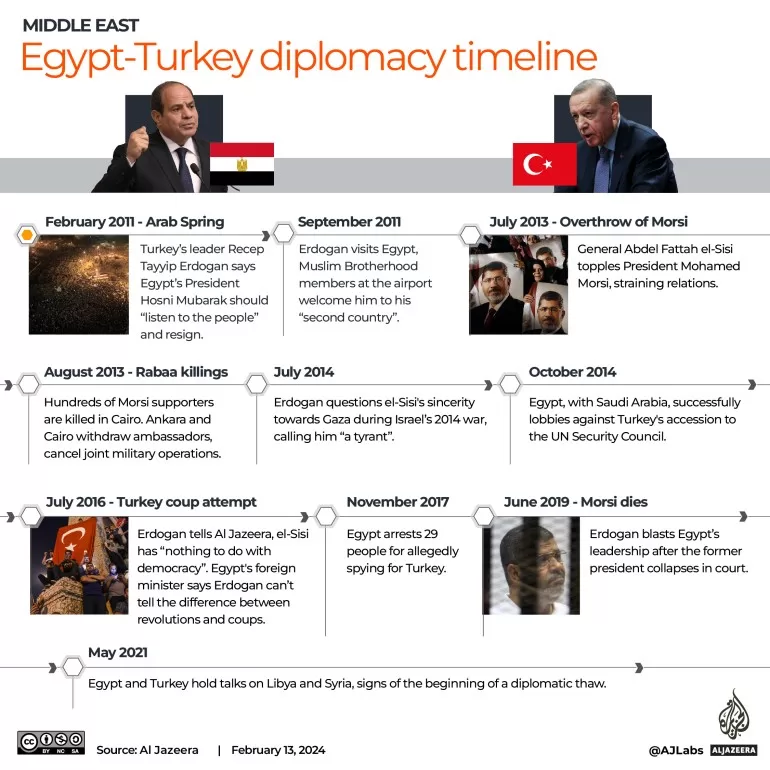“We will discuss various issues including economy, trade, tourism, energy and defence with Mr Sisi,” Erdogan said during a televised address ahead of the pair’s meeting in Egypt on Wednesday.
After years of diplomatic hostility, relations between the two countries have warmed recently. However, while broadly welcoming of any detente, analysts were cautious as to how much difference this might make to the continuing war in Gaza.
Following talks between both states’ foreign ministries, the presidents used the 2022 World Cup in Qatar as the stage on which to be photographed shaking hands, before appointing ambassadors in July last year.
Old disagreements
Relations had been fractious since former General el-Sisi overthrew Erdogan’s ally, Muslim Brotherhood President Mohamed Morsi, in a “popular coup” in 2013.
Since then, further to trading barbs, the countries have competed in various regional conflicts, from supporting rival parliaments in Libya’s civil war to taking opposing sides on the blockade of Qatar, when Turkey provided the country with diplomatic and practical support through the crisis from 2017 to 2021 as Egypt and others severed relations.
Gaza has long been at the forefront of both countries’ foreign policy. Egypt has had full diplomatic relations with Israel since 1979, established during the Camp David Accords. However, Cairo has often found these relations tested by Israel’s actions towards Gaza and Palestine.
Turkey’s relations with Israel have been less friendly. Erdogan has consistently spoken on behalf of the Palestinian people and most recently called upon Israel to recognise an independent Palestinian state based on the 1967 borders.
“Turkey and Egypt working together is unlikely to have a major impact on the Israeli military operation in Gaza,” Saif Islam, an associate at London-based risk analysts S-RM said.
“They will primarily call on Israel to agree to a permanent ceasefire or limit civilian casualties in Gaza at the very least, and demand that more humanitarian aid enter Gaza,” he said.
Islam said neither side was willing to inflame tensions further and el-Sisi was likely hoping to enlist the support of Turkey, Saudi Arabia and others to help mitigate the humanitarian impact of the war in Gaza.
The ties that bind
Beyond present circumstances and past difficulties, economic ties have continued. Egypt and Turkey have long enjoyed a healthy trading relationship, with travel, tourism and energy featuring highly.
“Financial relations continued unchecked,” Ahmed Morsy, a senior researcher at the Stockholm Institute of Peace Research Institute (SIPRI) said, “Turkey continues to act as a flight hub for Egypt, while joint ventures and tourism between the two states has continued throughout,” he added.
A way forward
Analysts have said that the building of relations between the two states will rest on the identification of areas of common practical interest.
“I think what we’re seeing is a pause in competition in various territories, such as Libya and Syria, rather than the emergence of any new regional dynamic,” Morsy said.
“Each state is looking for areas that they can build upon and benefit from.”
Egyptian exports to Turkey increased to $4bn in 2022 from $3bn the previous year, government statistics showed.
In September of last year, Egypt’s trade minister announced he hoped to increase bilateral trade between the two states to anywhere from $10bn to $15bn over the next five years.
Further accelerating the need for cooperation has been the increased competition for energy that has taken place since Russia’s invasion of Ukraine pushed prices up, a matter reported to have been discussed between the two leaders on the sidelines of last year’s G20 Summit in India.
With several of its long-term contracts expiring, Turkey has looked increasingly to Egypt for supplies of liquid natural gas (LNG).
Equally, with labour costs relatively low as the Egyptian pound struggles, Turkish companies have been eager to relocate to Egypt to better access international markets.
However, while neither Turkey or Egypt have yet to become economically dependent on the other, complex economic difficulties at home were prioritising dialogue in both countries over political grandstanding, Islam added.
“The lifting of the Qatar blockade also created opportunities for countries that had significant differences to try and iron out these differences.
“Egypt and Turkey have in fact been slower than other countries in trying to repair ties, but recent issues, such as the crisis in Gaza and the security situation in the Red Sea, are prompting them to engage each other with more urgency.”
While the rapprochement between Egypt and Turkey has been gradual, few would doubt that the war in Gaza has granted it impetus.
